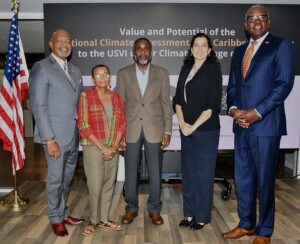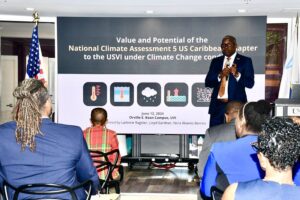
Gov. Albert Bryan Jr. and Lt. Gov. Tregenza Roach participated Wednesday in an information session on climate change conducted at the UVI Innovation Center by UVI President Emerita LaVerne E. Ragster, Ph.D.
The governor said the session, which was attended by Cabinet members and representatives of key government agencies, was an “effort to move forward in a cohesive manner” to address the effects of climate change in the territory.
Elevated temperatures, increased rainfall, more frequent and intense hurricanes are all signs that climate change is real and climate-related extremes are the new normal.
“It’s imperative that we plan for a more intense and less predictable climate than we’ve been used to,” Bryan said. “We’re experiencing warmer temperatures and more rainfall outside of what used to be called the rainy season. These are signs that our climate is changing, and we’ve got to be ready to address the impacts on the way we live.”

In 2023, numerous temperature records were shattered, especially on St. Croix, where it was the warmest year on record, according to Ragster. With an aging population in the USVI, housing, transportation and agriculture are critically impacted by climate change.
Climate change degrades ecosystems like coral reefs, which protect low-lying areas from flooding. Facilities such as power plants, marine ports and airports are impacted by storm-induced flooding. Water and food security become increasingly vulnerable, creating a need for governmental agencies to create contingency plans.
“We’ve got to come together and be collaborative in our approach,” Bryan said. “We need to have a climate change response ingrained in the culture going forward.”
Editor’s Note: A previous version of this story misstated Lloyd Gardner’s affiliation. He is executive director of the Foundation for Development Planning Inc.


